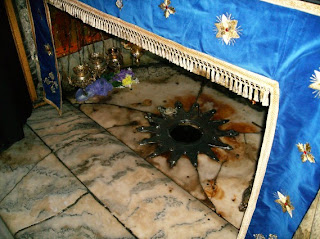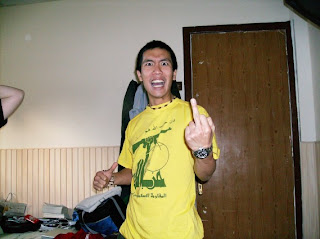
Before I start, I want to state unequivocally that I had an amazing Christmas in the Holy Land. What follows is simply a bit of a reflection.
* * *
One of the things I’d most looked forward to in the Middle East was the prospect of Christmas in Bethlehem.
To explain this, a trip down Memory Lane. First stop: Desolation Row. Yes, the old blog, which I ran with Kieran Nelson. One of his first posts was titled: “The War on Christmas.” Some excerpts:
“Tis the season to be ranting about my favorite love-hate holiday of the year: Christmas…
It’s the season of cheap Tim Allen movies, crappy weather, mass-manufactured lawn art, crowded grocery stores with empty shelves, and christmas wish lists being eagerly scribed by soon-to-be-disappointed young children. It means garish decorations in overcrowded shopping malls with filled parking lots. It means countless ads for video games and annoying plastic race-car tracks. It means bratty offspring act like angels for two weeks so they can reap hundreds or thousands of dollars worth of gifts on Christmas morning. It means infomercial ads for poor quality tool sets, specifically designed to lure wives into buying them for their husbands.
And the songs. The constant music; the recurrent bubble-gummy, cat-strangling renditions of festive English Christmas songs. Not to mention the most irritating and unlistenable song of all: Jingle Bell Rock...
, …we have to withstand an onslaught of unappealing culture that a lot of people accept without really paying attention to its commercial undertones, or its cheap, fake, manufactured glow.
… I for one am not going to spend my Christmas listening to awful jingles, joining queues to enter stores in bustling malls, watching reruns of Charlie Brown in between endless annoying ads, maxing out my Visa, or putting effigies of Santa on the lawn… Perhaps with effort, I can take from Christmas this year only the aspects I like, and entirely ignore the ugly and superficial culture that surrounds it.
Happy Holidays from Desolation Row.”
Yeah, it’s cynical. But if you think that’s all it is, you’re missing the point. Kieran’s saying that North American Christmas is cheapened by the runaway "Deck The Malls" commercialization of everything great about the holiday season: family, friends, food, fireplaces, and fun.
And I agreed. I wanted a meaningful Christmas. I wanted to celebrate Christmas as a holiday, not consume it as a product. And I figured the best way to do that was to put the “Christ” back in Christmas.
Now, I don’t subscribe to the mythology of a mad Jewish rabbi, who, supposedly born to a virgin in Roman Palestine two thousand years ago, later performed the metaphysically-astounding feat of removing all the sins of Mankind by being nailed to a pair of two-by-fours. Not anymore, anyway.
But I was raised Catholic (back in the Dark Ages), and some old feelings die hard. Why not go back to my roots? A solemn, sacred, pilgrim’s Christmas, free of the trappings of Santa and Sinatra and the strip mall, in the pressing aura of the cradle of Christianity.
And so it was.
There were no jingles on the radio. No heaps of red and green bunting strung from streetlamps. No lights hung from the balconies of apartments or from the rafters of the malls. No twenty-foot plastic trees, strung with a hundred yards of tinsel and a thousand multicolored balls, crowned with a sequined star, towering above public squares and inside building lobbies. No Santa Clauses. No frantic, last-minute shopping expeditions. No 20-lbs turkeys, sitting pimply pink and naked, at the supermarket’s meat section.
Just the regular hustle-bustle of life. This was Israel and Palestine. Jews and Muslims. They didn’t celebrate Christmas, and certainly not our model of it.

Instead, it was religious. In Jerusalem’s Church of the Holy Sepulcher, lines of pilgrims mumbled the Rosary in the shadow of the rocks of Golgotha, where Christ was crucified. They wept and prostrated themselves over the slab of rose-tinted rock where his body was laid out for burial. They stood silently in line to enter the rickety wooden shack that marked the cave where he was buried for three days. In Bethlehem’s Church of the Nativity, they kissed the silver star embedded in the marble floor, where a solemn Greek priest told the crowd the manger had once been.

Catholic nuns in their plain habits. Greek Orthodox priests in their black robes. Decadent, sumptuous iconography- dim-flaring lamps, heavy crucifixes and carvings of the Virgin Mother and Child, dripping with gold and silver. Intricate, multi-hued mosaics. Towering church arches and candle-lit prayer cellars. Choirs. Processions. Prayers. Homilies. Mass after mass after mass. The sweet musk of incense and the dull murmur of prayer. Our Father, who art in Heaven. Hail Mary, full of grace.

Amidst the holiness was an oddly touching sense of community. In this land of Jews and Muslims, people had come from the four corners of the earth, just once every year, to be Christians. There was an unspoken tribal solidarity in those churches. In a dozen languages, tips, favors, and good wishes were traded.

There was also a tired routine to the experience- something very rinsed-and-repeated about the way the faceless masses herded past the same holy sites, posed for pictures (some would stand, lips pressed against some old rock or painting for half a minute, while their wife or brother-in-law fumbled with the camera), mumbled rushed prayers, and were chased on by priests anxious to avoid a clog-up: “Okay, there are a lot of people waiting, yes? Pray quickly, yes? Move along. Next!”
I imagined that every morning of the holiday season, all the priests of the Church of the Holy Sepulcher and the Church of the Nativity would gather for a pep-talk:
“Okay, lads. Take a knee. Whew. Okay. Lotta gringos comin’ in today. Lotta tourists. We gotta get them through quickly. Don’t let ‘em pray for more than thirty seconds. And don’t let them kiss the Burial Slab for too long. Some of ‘em practically make out with the damned thing, and the saliva’s a bitch to mop up. You, Brother Gregorios, you big lunk. Don’t let ‘em take pictures inside the Tomb of Christ. The flash ruins the paint. Any questions? Okay, hands in, hands in. One! Two! Three! AMEN!”

I won’t lie. Everyone’s a Christian-for-the-holidays in the Holy Land. I said the Lord’s Prayer for the first time in a decade. I didn’t even flinch when a fat old woman from Spain crushed my bones with a hug, wept on my shoulder, and blubbered: “Lord Jesus bless you, child. I love you!” (I think I responded: “Peace be with you too, ma’am.”) I visited every icon and shrine. (And actually kissed one. It was slimy.) I read the Bible. I went to mass, mumbled the appropriate lines, and even crossed myself a few times. Spectacles, testicles…
And I didn’t feel a thing.
No sense of belonging. No resonance. I didn’t feel touched by the hand of God. The whole experience was as alien to me as an Iroquois rain dance. If anything, there was that bemused, analytical detachment I get whenever I read economic theory or visit a mosque. Hell, I had more of an emotional connection to…
… secret Santas?
What the fuck?

The last time my friends and I organized Secret Santas had been two years ago, before we had all graduated. We stayed up till God-awful in the morning, listening to those bubble-gummy jingles and watching cheesy Christmas cartoons, drinking egg nog and munching on some tasty pastry the girls had concocted. I had bought Nick a Canucks T-shirt (Nick could never have too many clean shirts), and Mike had bought me a rice-cooker… cheeky bastard.
I stood there in the Church of the Holy Sepulcher, and a flood of memories rushed back. Laughing at the try-hards in my old neighborhood who strung up their Christmas lights in November… and then putting up our own a week later. Looking for Boxing Week sales with Gavin or my old man at Richmond Mall, with its Chinese Santa Claus who spoke Cantonese and was probably repeating his last name three times: “Ho! Ho! Ho!” Groaning at- and then singing along to- the diarrhea stream of carbon copy tunes on everyone’s iTunes. (Nick’s mix was titled “S-antastic Cl-awesome”.) The bursting catalogues of video games, hardware and other big boys’ toys released specially for the holidays, that I could max out my visa on. And yes, those goddamned fake, twenty-foot plastic trees that don’t even have that good ol’ earthy pine scent.

I realized I missed North American Christmas. Yes, even with “its commercial undertones, and its cheap, fake, manufactured glow.” This model of Christmas, with all its familiar flaws, was all that I knew and loved. It’s MY culture and heritage. I realized that the spiritual experience I’d hoped for couldn’t be gotten from intoned rituals and these supposed holy places of “mystique” and “sanctity”. It comes from community, from being with friends and family, and all that is familiar and that resonates with your past. It’s being where you know you are “home”.

It took many years for a million niggling hints to form up into this one conclusion. Christmas in Israel just pushed it over the edge. Hey, I know I'll never stop wandering and wondering. I’ve seen the sun rise on many a foreign shore, and watched the stars wheel over many a strange skyline. Ultramodern Singapore and quaint Halifax. Marble-sheathed Rome and smog-shrouded Bangkok. Schizoid, tribal Beirut. And Jerusalem, of bronze and light and gold.
But I’ll never again pretend that Vancity- that cosmopolitan, image-driven Ikea showcase of a town- isn’t home.

Next year, no matter where I am in November, I know where I’ll be in December. I’m going home for the holidays. Vancouver, between the mountains and the sea. No place like it.
Yes, even with Jingle Bell Rock and Boxing Day line-ups.
Hell. Especially with Jingle Bell Rock and Boxing Day line-ups.






































